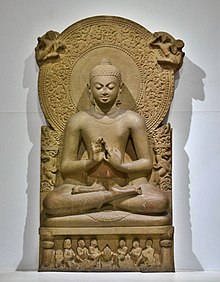Portal:Nepal/Featured biography/8
Siddhartha Gautama, most commonly referred to as the Buddha ('the awakened'), was a wandering ascetic and religious teacher who lived in South Asia during the 6th or 5th century BCE and founded Buddhism. According to Buddhist legends, he was born in Lumbini, in what is now Nepal, to royal parents of the Shakya clan, but renounced his home life to live as a wandering ascetic. After leading a life of mendicancy, asceticism, and meditation, he attained nirvana at Bodh Gaya in what is now India. The Buddha then wandered through the lower Indo-Gangetic Plain, teaching and building a monastic order. Buddhist tradition holds he died in Kushinagar and reached parinirvana ("final release from conditioned existence").
According to Buddhist tradition, the Buddha taught a Middle Way between sensual indulgence and severe asceticism, leading to freedom from ignorance, craving, rebirth, and suffering. His core teachings are summarized in the Four Noble Truths and the Noble Eightfold Path, a training of the mind that includes ethical training and kindness toward others, and meditative practices such as sense restraint, mindfulness, dhyana (meditation proper) and the concepts of the five skandhas and dependent origination, describing how all dharmas (both mental states and concrete 'things') come into being, and cease to be, depending on other dharmas, lacking an existence on their own svabhava).
A couple of centuries after his death, he came to be known by the title Buddha, which means 'Awakened One' or 'Enlightened One'. his teachings were compiled by the Buddhist community in the Vinaya, his codes for monastic practice, and the Sutta Piṭaka, a compilation of teachings based on his discourses. These were passed down in Middle Indo-Aryan dialects through an oral tradition. Later generations composed additional texts, such as systematic treatises known as Abhidharma, biographies of the Buddha, collections of stories about his past lives known as Jataka tales, and additional discourses, i.e., the Mahayana sutras. (Full article...)

